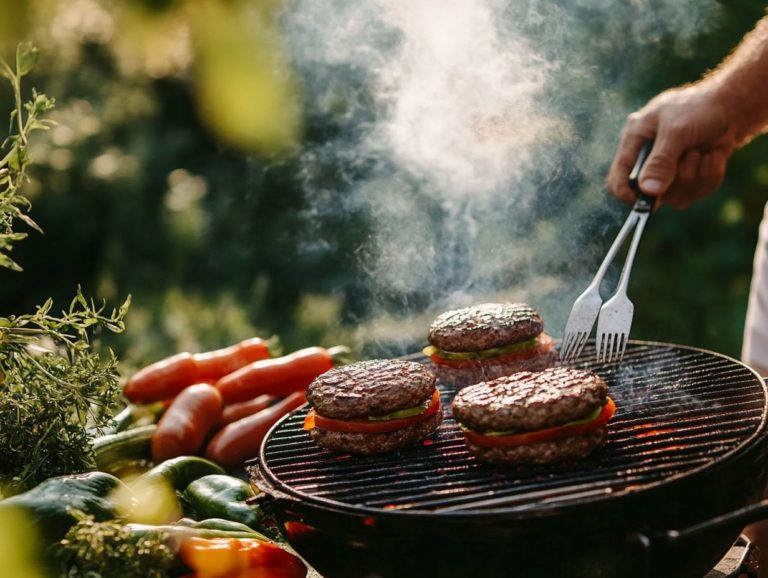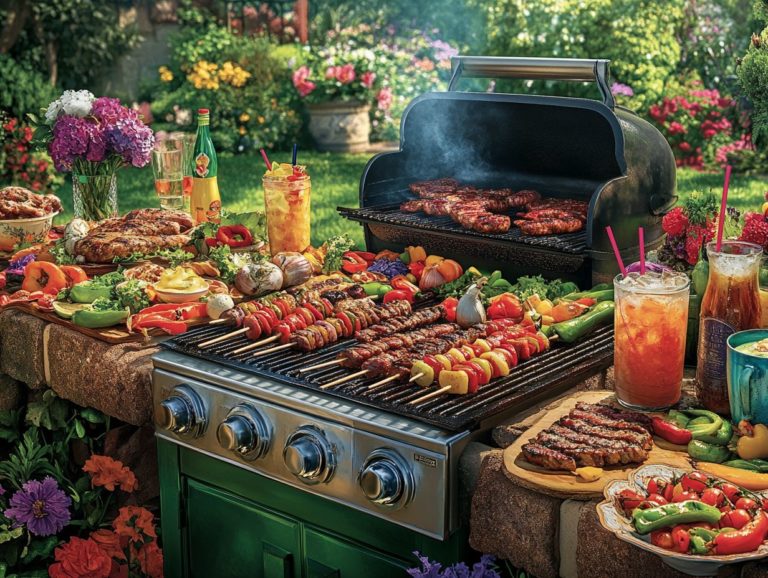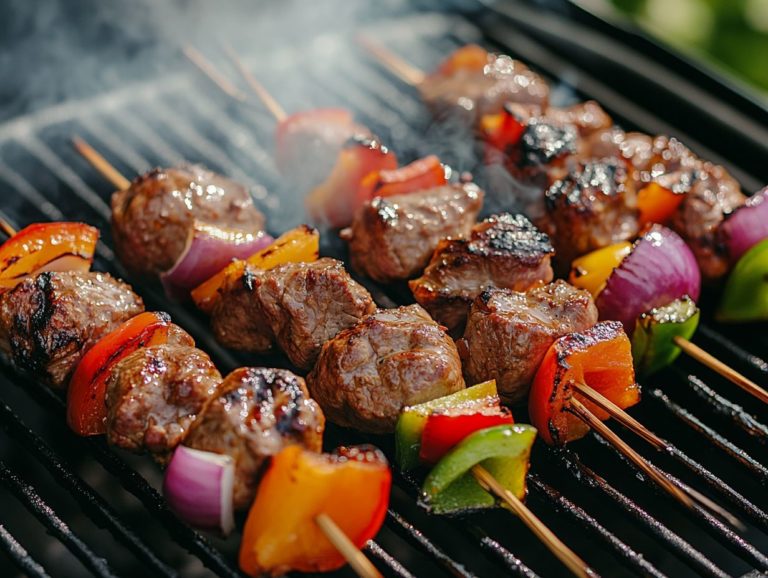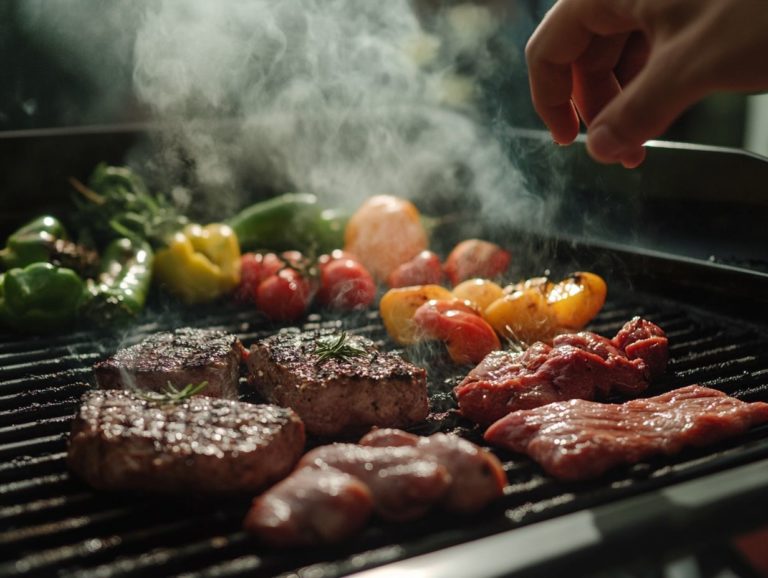5 Tips for Grilling in Rainy Weather
Grilling in rainy weather might feel like an uphill battle, but with the right strategy, you can savor mouthwatering outdoor meals regardless of the gloomy skies. Consider using a RocketFire Torch or Chef Charlie McKenna’s marinades for an added flavor boost.
This guide presents five essential tips that will make your grilling experience enjoyable and safe, even when the rain pours down. These tips are perfect for a backyard barbecue on Memorial Day or any rainy day. From choosing the ideal grill to setting up a sheltered cooking area, you ll discover how to refine your technique.
We will tackle potential hazards and explore alternative cooking methods for those persistent rainy days. Keep reading to turn your rainy day grilling into a cooking experience!
Contents
Key Takeaways:
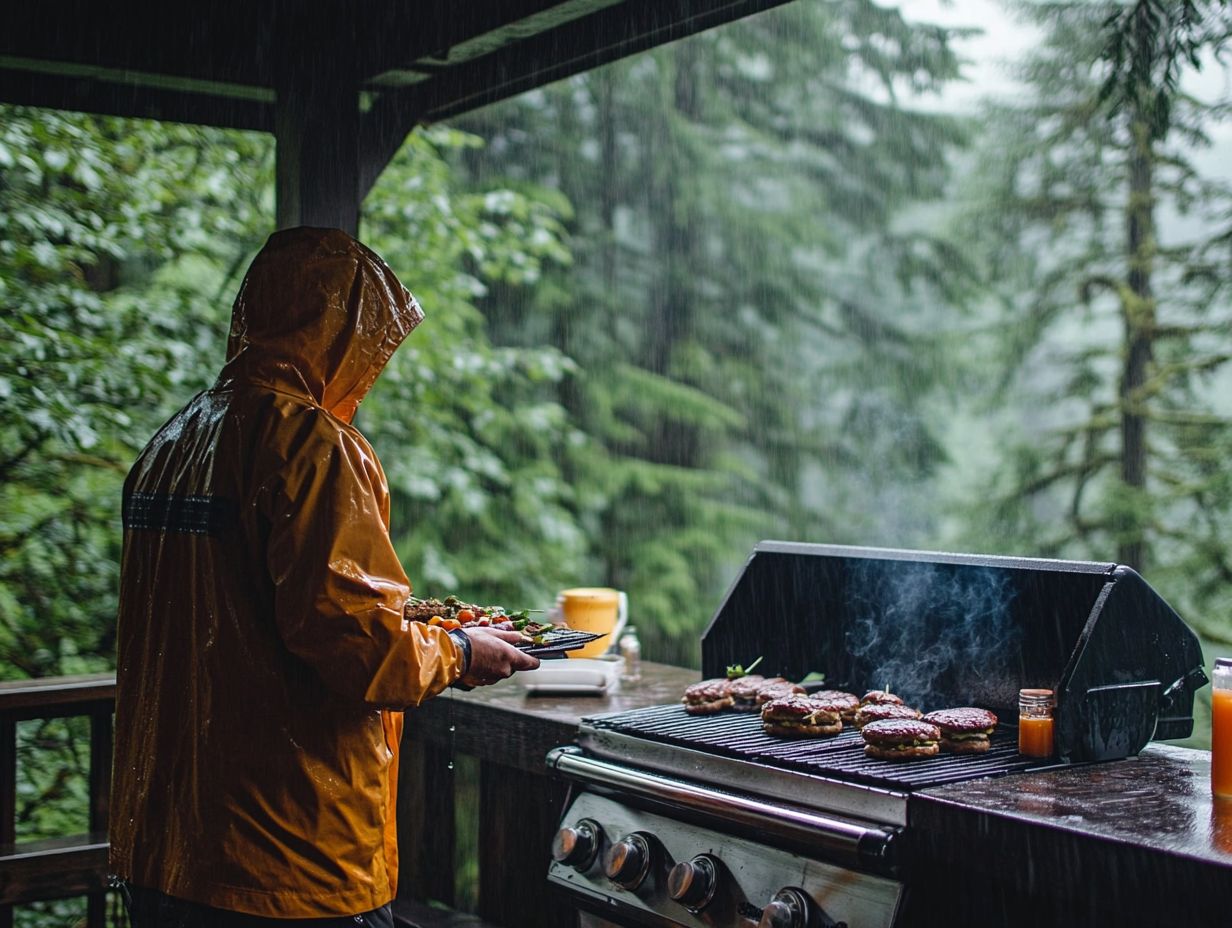
- When grilling in rainy weather, choose a grill that is able to withstand rain and wind. A grill cover will help protect your grill from the elements.
- Set up a sheltered area for your grill to shield it from rain and wind. This can be achieved with a pop-up canopy or by grilling under an overhang.
- Using a grill cover is crucial when grilling in the rain. It will protect your grill from the elements and help prevent accidents.
1. Choose the Right Grill
Choosing the right grill is essential for crafting a perfect backyard barbecue experience. With options like charcoal and gas grills, each brings its unique advantages and flavors that can enhance your grilled dishes. Experts like Chef Charlie McKenna from Illinois emphasize the importance of selecting a grill that fits your cooking style and the weather conditions you might face.
Charcoal grills are known for delivering a distinct smoky flavor, making them ideal for those who enjoy traditional barbecue. However, they do require more maintenance and time for setup and cleanup.
On the other hand, gas grills offer convenience and easier temperature control, making them a great choice when the weather is unpredictable. They ignite quickly and are less affected by wind or rain.
Safety is paramount; gas grills typically come with built-in safety features, while charcoal requires careful handling of hot coals. Understanding the pros and cons of each option will empower you to make a choice that caters to your preferences and adapts to changing weather.
2. Set Up a Sheltered Area
Creating a sheltered area for grilling can significantly enhance your experience, keeping your grill station dry and functional when the weather acts up. Whether you choose a stylish patio umbrella or a robust grill gazebo, both options offer protection against rain and wind, allowing you to savor the barbecue atmosphere without a hitch.
These choices not only shield the grill but also create a comfortable space for you and your guests, transforming your outdoor area into a cozy gathering hub. A patio umbrella provides versatility and portability, making it easy for you to shift its position as the sun moves across the sky. A grill gazebo, however, serves as a more permanent solution, often equipped with built-in shelves and lighting for added convenience.
Both styles enhance grilling safety by protecting your equipment from the elements, prolonging the grill’s lifespan, and ensuring you can whip up delicious meals throughout the year, come rain or shine.
3. Use a Grill Cover
A grill cover is a must-have item for you as a grill owner, safeguarding your charcoal or gas grill from the elements and ensuring its longevity and performance, especially during rainy or windy conditions. Plus, it helps you stay updated on changing weather patterns through a reliable weather application.
Understanding the different types of grill covers available empowers you to make a well-informed choice. These covers are typically crafted from durable materials such as polyester, vinyl, or canvas, each providing varying degrees of water resistance and breathability.
Selecting a cover that fits snugly around your grill is key to shielding it from rain, dust, and debris, thus maintaining its functionality. When choosing a grill cover, it s important to consider the specific type of grill you have and the climate in your area. For instance, lightweight covers might suffice in milder regions, while heavier, more robust options are essential in areas known for harsh weather conditions.
4. Adjust Your Cooking Time and Temperature
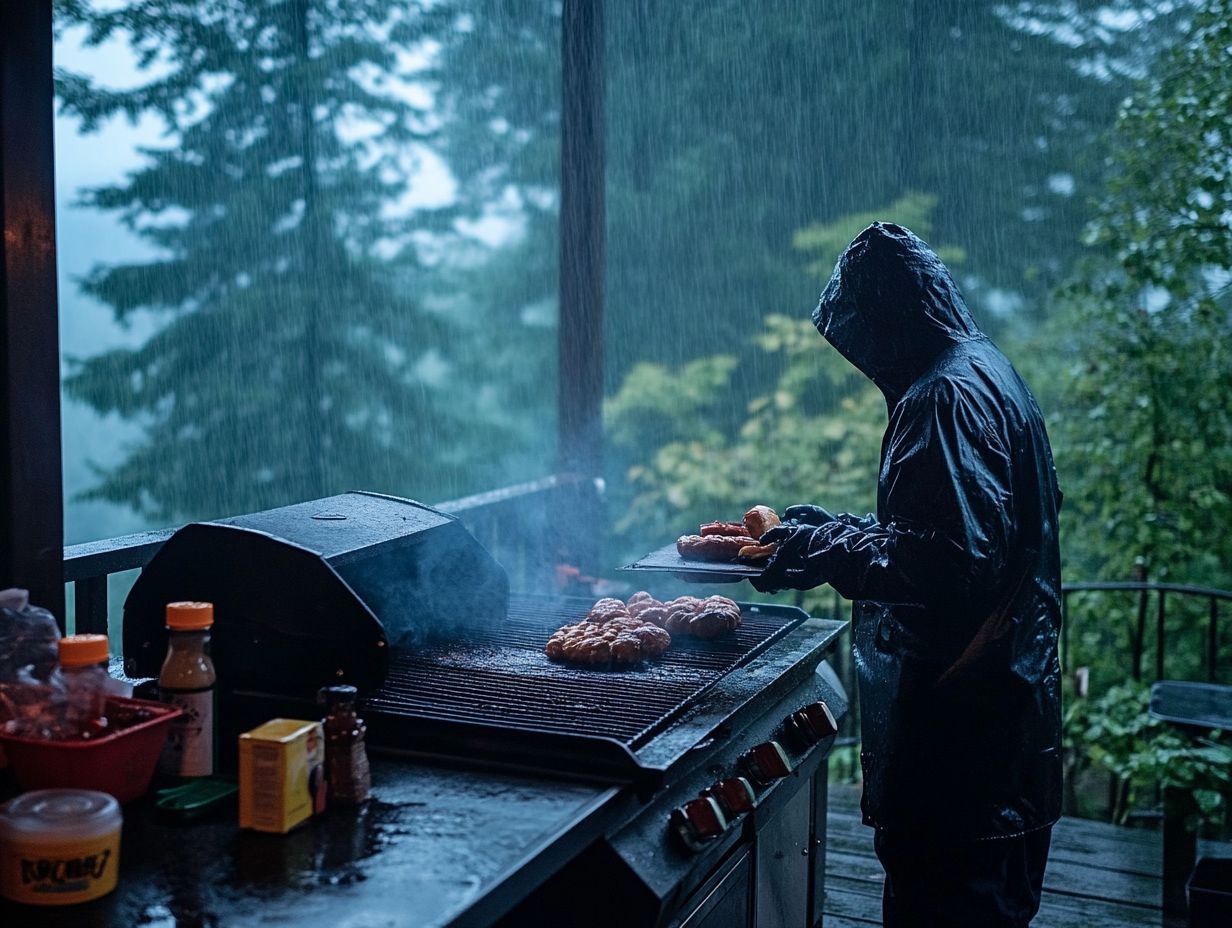
When you’re grilling in challenging weather conditions, adjusting your cooking time and temperature becomes essential for achieving that perfectly cooked meal, whether you prefer a charcoal grill or a gas grill. Using a remote thermometer can be a game-changer, helping you monitor internal temperatures to ensure food safety and quality, even when the elements aren’t cooperating.
Weather can dramatically influence the grilling process. Rain often cools things down, while humidity can introduce unpredictable cooking dynamics. Wind can also affect your grilling, leading to uneven heat distribution and making your cooking time stretch longer than anticipated.
Shield your grill from the wind or invest in a heavy-duty cover for rain protection. Using a remote thermometer is not just a matter of convenience; it keeps you informed without the need to constantly lift the lid and let all that precious heat escape.
Maintaining a close watch on the internal temperature of meats like chicken and beef is crucial. This ensures they hit the safety benchmarks during cooking, delivering both delicious flavor and the peace of mind you deserve.
5. Have a Backup Plan
Having a backup plan for grilling is crucial, especially when the weather decides to throw a curveball. When rain clouds roll in unexpectedly, knowing how to transport your food safely or switch to indoor cooking methods can save your backyard barbecue from becoming a soggy disappointment.
To tackle these challenges, consider investing in a portable grill. This versatile option allows you to cook even in tight spaces or tricky weather conditions. If the weather isn’t good, try cooking indoors using your oven or stovetop griddle to maintain that outdoor grilling spirit.
Smart food transport solutions, such as insulated bags or coolers, are essential for keeping your ingredients fresh and safe until it s time to cook. By planning ahead in these ways, you can enjoy a safe and flavorful grilling experience, rain or shine.
What Are the Dangers of Grilling in Rainy Weather?
Grilling in rainy weather introduces a distinct array of challenges that every barbecue enthusiast should thoughtfully consider. From slippery surfaces that threaten safety to potential electrical hazards with gas grills, and the struggle to maintain consistent heat on charcoal grills when wind and rain conspire against you, being prepared is key. For those facing breezy conditions, check out these 5 tips for grilling in windy conditions to enhance your outdoor cooking experience!
To create a safe grilling space, make sure to secure your grilling area with mats or towels to diminish slipperiness and prevent accidental falls. If you’re using a gas grill, it’s prudent to cover it and position it away from any water sources, thereby reducing the risk of electrical issues.
For those opting for charcoal, be ready for temperature fluctuations by keeping extra charcoal on hand for quick adjustments when the heat dips unexpectedly. Always keep a fire extinguisher within arm’s reach, just in case the unexpected happens. And remember, if the storm escalates, it s best to postpone your grilling plans!
What Are the Best Types of Grills for Rainy Weather?
When selecting the ideal grill for those rainy days, both charcoal and gas grills bring unique advantages. The Tri-Flame Cone Tip helps improve ignition in damp conditions. However, understanding how each performs under less-than-ideal circumstances, along with using a reliable weather app to keep an eye on the weather changes, can significantly enhance your outdoor cooking experience while ensuring your safety.
Charcoal grills are great at holding heat, even when it’s damp, making them a favorite among grilling enthusiasts. That said, lighting them can be tricky when moisture is in the air; damp charcoal might struggle to catch fire.
Gas grills, on the other hand, typically light up effortlessly, providing a quick fix for those unexpected downpours. Experts point out that the consistent temperature control offered by gas grills is particularly beneficial when you’re aiming for even cooking during changing weather.
Ultimately, it s about what you prefer, as both grilling methods offer distinct advantages in the rain.
How Can You Create a Sheltered Area for Grilling?
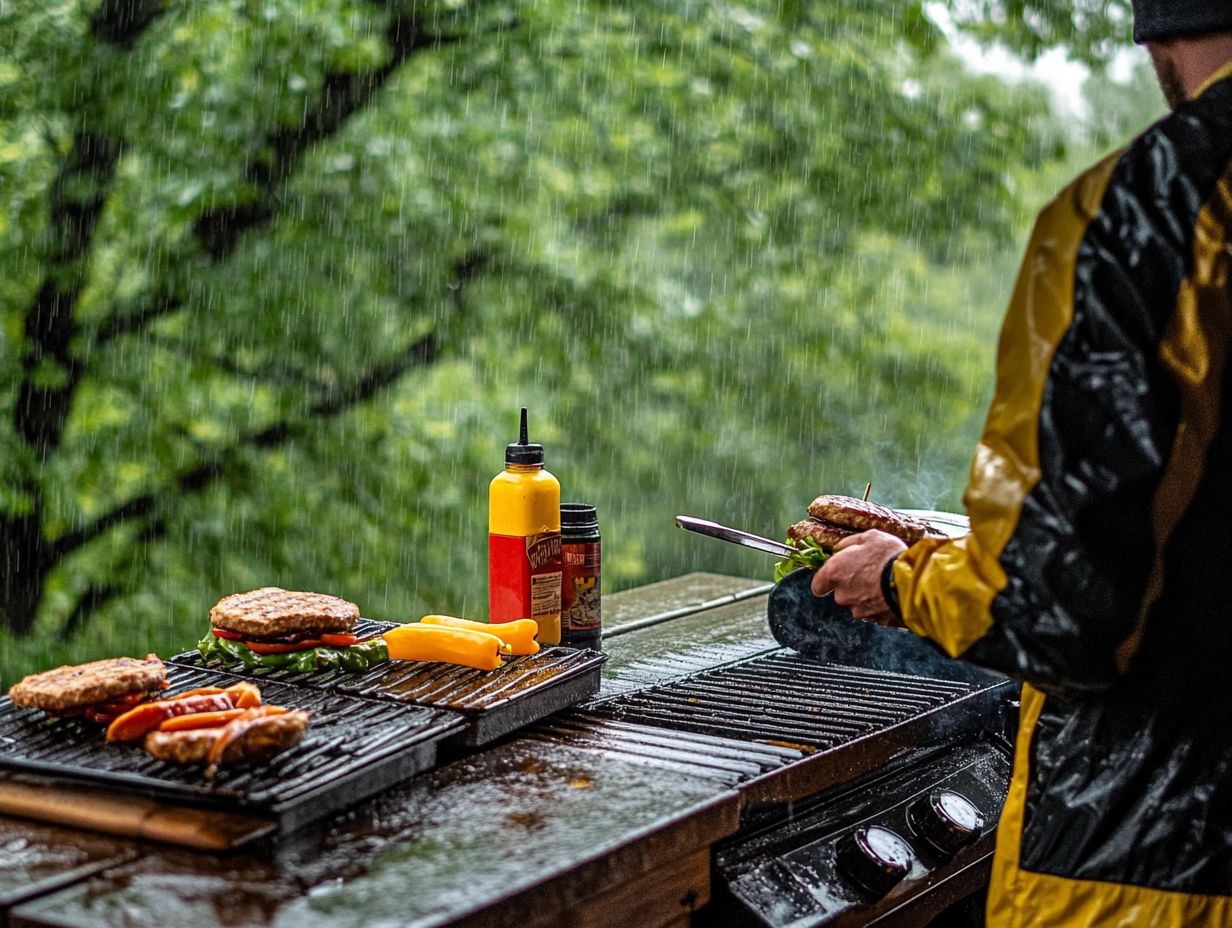
Creating a sheltered space for your grilling adventures can be as simple as popping up a patio umbrella or investing in a stylish grill gazebo. Either option keeps you grilling, rain or shine, ensuring that your grilling station remains functional and inviting, regardless of the weather.
There are various ways to elevate your grilling experience. If you enjoy DIY projects, consider crafting a simple wooden pergola or installing trellises adorned with climbing plants. These options look great and keep you dry.
If you prefer a more commercial approach, retractable awnings or sturdy canopies allow for quick setup and flexibility, all while offering the durability needed to withstand stronger winds and heavier rain. Each of these solutions not only safeguards your grilling area but also enhances your outdoor cooking experience, allowing you to enjoy gatherings with family and friends in comfort and style.
What Are the Benefits of Using a Grill Cover?
Using a grill cover offers many benefits, from extending the lifespan of both charcoal and gas grills to enhancing safety by protecting your equipment against rain, debris, and temperature fluctuations.
These protective features are essential for preventing rust and discoloration, which can easily occur from repeated exposure to harsh outdoor elements. Choose strong grill covers designed to shield your grill from moisture and UV rays, effectively minimizing the risk of corrosion and paint fading.
When choosing the right cover, it s crucial to consider the specific size and type of your grill to ensure a snug fit. A well-fitted cover provides maximum protection, keeping dust and pests at bay. Look for covers with reinforced seams and breathable materials to promote air circulation and prevent mildew, ensuring your grill remains in pristine condition for every cooking adventure.
How Can You Adjust Your Cooking Technique for Rainy Weather?
Adjusting your cooking technique for rainy weather is crucial for making tasty food while ensuring grilling safety. This may involve modifying your cooking time and closely monitoring the internal temperature of your food. To enhance your outdoor cooking experience, consider following 5 tips for safe fire pit cooking. Utilizing tools like a remote thermometer can help achieve optimal results.
When the sky darkens and raindrops begin to fall, it s essential to adapt your cooking times and reassess temperature settings to ensure your food cooks evenly and thoroughly. Lowering the grill’s heat slightly can help counteract the moisture’s impact on cooking efficiency. It s also wise to extend overall cooking times to guarantee that everything is perfectly cooked inside.
Using a remote thermometer helps eliminate guesswork about doneness. This allows you to maintain a safe distance from the grill while keeping a close eye on internal temperatures. If unexpected rain becomes a challenge, consider investing in a grill gazebo or a waterproof cover to create a consistent cooking environment. This way, you can continue to enjoy beautifully grilled meals, come rain or shine!
What Are Some Alternative Ways to Cook in Rainy Weather?
When rain throws a wrench in your grilling plans, having alternative cooking methods ready can truly save the day! From indoor cooking solutions to stovetop grilling pans, these backup strategies ensure that safety and deliciousness prevail, no matter the weather.
With the right tools and techniques, you can easily recreate that smoky flavor right in your kitchen. Instead of braving the elements, use an oven broiler or an electric grill; both can mimic the high temperatures and charring that make grilling delightful.
To transport prepped food safely, rely on insulated bags or containers to keep your meats and vegetables at safe temperatures. Always prioritize safety by ensuring adequate ventilation and closely monitoring cooking times to avoid any hiccups.
These adaptations not only preserve the joy of cooking but also bring the great outdoors inside, allowing you to savor flavorful dishes throughout the year.
Frequently Asked Questions
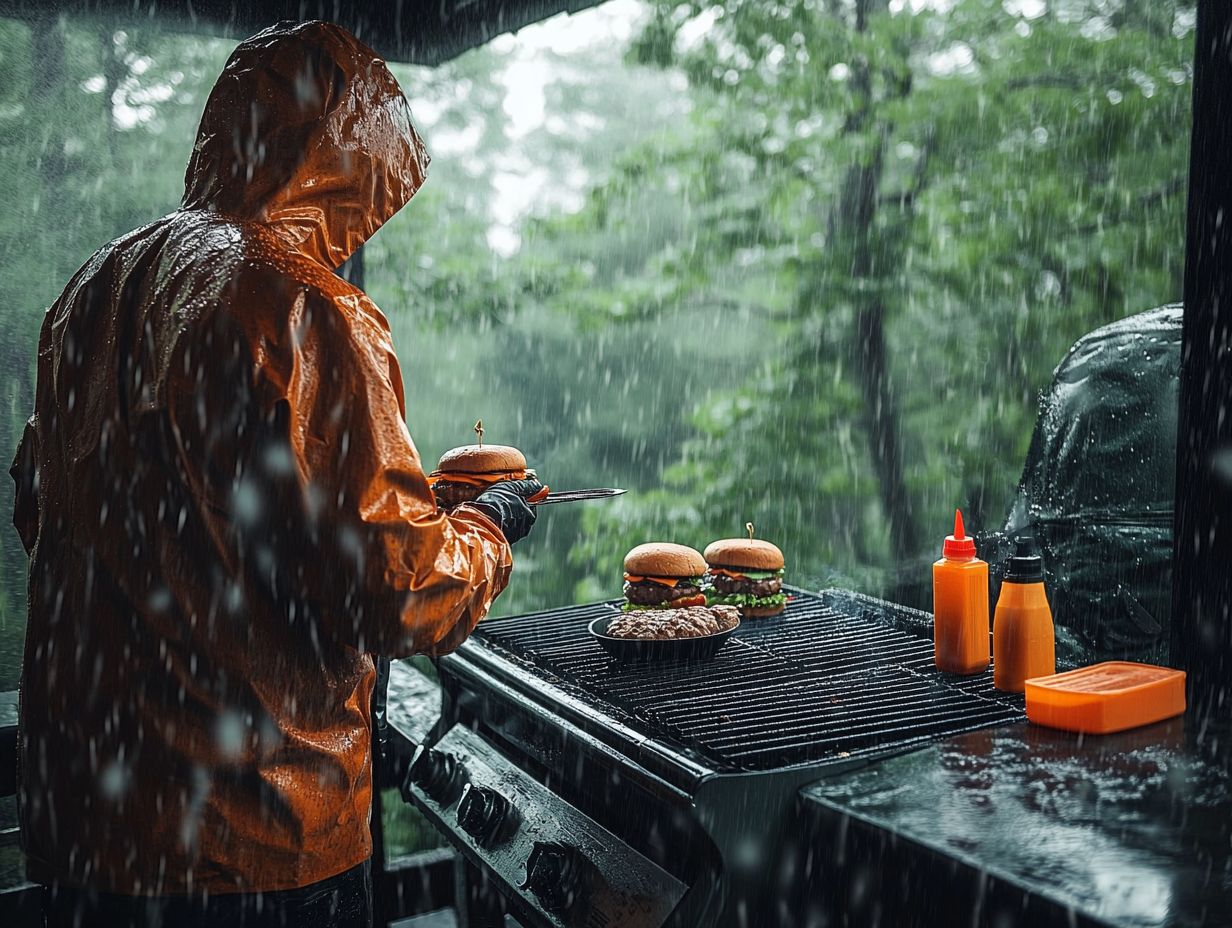
What are the top 5 tips for grilling in rainy weather?
- Choose a covered or indoor grilling option: Use a covered grill or an indoor grill to protect the food and your cooking area from the rain.
- Use a grill umbrella or canopy: Invest in a grill umbrella or canopy to keep the rain off your food and grill.
- Keep your grill close to a sheltered area: Position your grill close to a sheltered area such as a porch or overhang.
- Use a waterproof grill cover: Cover your grill with a waterproof cover when not in use to prevent rusting and damage from the rain.
- Opt for quick-cooking foods: Choose foods that cook quickly, such as burgers, chicken breasts, and vegetables.
Is it safe to grill in the rain?
Yes, it is generally safe to grill in the rain as long as you take necessary precautions to protect yourself and your food from the weather. Follow safety guidelines and use a covered or sheltered grilling option when possible.
Can you use an electric grill in the rain?
No, it is not recommended to use an electric grill in the rain as it can pose a safety hazard. Water and electricity do not mix, so avoid using an electric grill in wet conditions.
How do you prevent your grill from rusting in rainy weather?
To prevent your grill from rusting in rainy weather, cover it with a waterproof grill cover when not in use. Applying a coat of cooking oil to the grill grates before and after grilling can also create a barrier against moisture.
What are the best foods to grill in rainy weather?
Foods that cook quickly, such as burgers, chicken breasts, and vegetables, are ideal for grilling in rainy weather. Avoid grilling large cuts of meat or foods that require a longer cook time as they are more likely to be affected by the rain.
Can You Use Charcoal Briquettes in the Rain?
Using charcoal briquettes in the rain is not a good idea. They can get damp and hard to light.
If you need to grill, look for a sheltered spot or use a covered grill to keep the briquettes dry.


